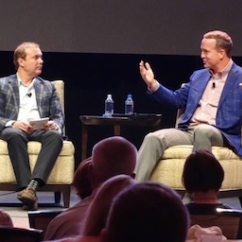Sales Strategy
Peyton Manning On Leadership, Mentoring, Fast Thinking, And Getting Hit By Very Large Linebackers | March 01, 2017 (0 comments)

Scottsdale, AZ—What can a renowned NFL quarterback know about running a jewelry store? As it turns out, quite a lot. At the Centurion Scottsdale show last month, legendary quarterback Peyton Manning (Indianapolis Colts, Denver Broncos) was the keynote speaker on Tuesday morning. Read a detailed summary of his presentation here.
After his prepared remarks, jeweler BJ Nichols of Reis-Nichols in Indianapolis was tapped to host a Q&A session with his hometown hero. (Left: BJ Nichols and Peyton Manning.) Naturally, the first question was about his first year of retirement. Manning said the thing he missed most was the team and being together with them all the time during the season, but he has been enjoying family time and being able to take his children to school. What he doesn’t miss is getting hit on the field, especially by Ray Lewis, a large former linebacker for the Colts’ archrival Baltimore Ravens, who Manning said hit him hardest of anyone, possibly to stage his own career comeback. The two ultimately became good friends off the field, but on the field “it wasn’t so friendly,” said Manning.
Questions ranged from mentoring and coaching to leadership and the connection between football and retail.
BJ Nichols: How do you identify individuals who are effective mentors? Who are yours?
Peyton Manning: Coaches have been tremendous mentors to me. Everyone can point to someone who had big impact [in their lives]: teachers, former bosses, et cetera. Don't ever stop being coached or mentored and think you can do it all. Eli and I had a coach mentor in common who would yell and do drills on the little things. How to stand in. How to huddle. How to take a five step drop, how to take a snap.
Why would a 14-year NFL player need that? But you do. Take care of the little things. Tony Dungy said take care of the little things and big things take care of themselves.
Dungy was a very unique style of leader, said Manning. He never raised his voice or used certain language, but he was very effective. “You never wanted to disappoint him. It was a very effective way of leading.
BJN: Thinking about your early seasons with the Colts, how did you establish yourself as a leader with veterans? Can you relate that to a young manager in the store?
PM: It’s embarrassing and humbling when you’re new on the job and have a leadership role. You have to earn the respect of the people you're leading. You can't come in and bark orders right away. The best way to earn respect is to learn about them all as a person.
I stayed quiet in the huddle all the rest of the season but was always first to practice and last to leave. In the weight room with the guys, they saw me studying, and all of a sudden you get that platform and they’re asking you questions and you realize you’re a leader. It’s silent leadership but you prove yourself and learn and earn respect.
You can’t talk to everyone the same. Some receivers wanted me to bark orders out loud, others I had to take aside and tell them what I needed. You have to figure out who they are as a person and get to know how they tick and treat them how they need to be treated.
BJN: A quarterback has a lot to think about as the action unfolds, and so does a business manager. What's on your mind as you step back into pocket to find the receiver and how do you relate that to a business manager greeting customers coming in the door?
PM: It’s not so much about throwing the pass as effective communication. You throw a pass and have 40 seconds to the next play and you have 20 seconds where you have to tell the receiver what to expect, and also you have info the linemen are feeding you: ‘hey, snap faster,’ or hey, he's flat-footed.’ It’s not about yelling and screaming and having cameras think you're a great leader, it's about communicating with your teammates: effective direct two-way communication without a middleman. If you have a way you want to present yourself when customer comes in, then you do it yourself.
BJN: You always had reputation for being the best-prepared quarterback. How?
PM: I’d study lots of films of opponents and films of myself. Lots of teams watch films by position but I believe in watching together and the coach says here's what one person is doing and here's what another is doing.
I was always nervous before a big game, that’s normal. But if I've done everything I could to get ready and I trusted the preparation, it gave me peace of mind.
There is going to be some monotony to it. At training camp every year, we got the same presentation, this is the schedule and so on, but I would write it all down anyway because the little things are important. Do those well and it comes together. Ignore those or brush it off and it falls apart.
BJN: Is calling audible purely instinctive in a game or a business deal?
PM: I was never out there just winging it. I was preparing for a wide range of possibilities. Through the week I’d stay up late watching films, and I’d look at the defense on Sunday and say, ‘I've seen this before. I saw this Wednesday night.’ It gave familiar comfort and I had thought about it: ‘if the defense does this, I'm going to do this.’ I had thought about it. When you make a change and you make it audible, the conviction is important. Never stutter on an audible. If you do, the defense realizes you don't know what they're doing, but if you’re firm they think you know what they are doing—even if you don’t.
BJN: What about bringing kids into business? You can say your family business is football.
PM: My parents were as surprised as anyone to have two kids in the NFL. We played all sports: football, baseball, basketball. Our parents thought all sports were good for team camaraderie, et cetera. Dad never coached sports with us unless we asked. If you push a kid, you can push them out. You can't force it on a child; if do that you can push them out.
BJN: Many of us think you have future as comedian. Where do comedy genes come from and what about a career in comedy?
PM: Our older brother Cooper was always quick-witted and we had deal: I'd help him be more serious he'd loosen me up. I don't take myself too seriously.
BJN: How do you have fun in business?
PM: You have to have a passion for it and enjoy it. It's hard work but you have to have joy in it. Enjoy the people you're with. That’s easy when things are great and everybody's in a great mood. It’s easy to be a good leader then but in adversity you see what everyone's made of.
It’s a tough time to find out who the rats are and who is going to jump ship and who is going to dig themselves out of hole. We lost a few games, we came together to see what strategies to change, and the most rewarding times were when we dug out of a hole and had good season.






